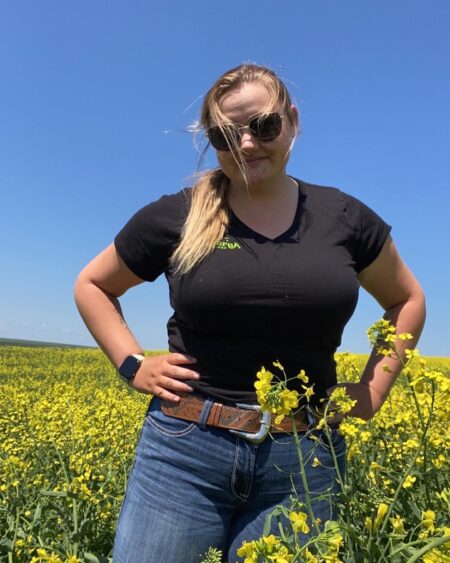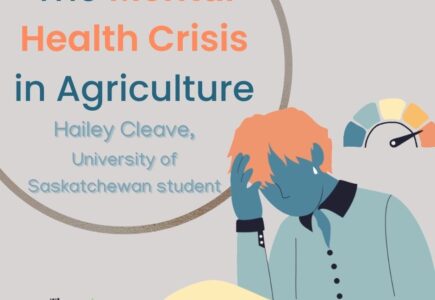By Hailey Cleave, University of Saskatchewan student
Mental health is becoming a widely discussed issue throughout industries across the world, but it is rarely discussed in one of the most affected industries by the mental health crisis: agriculture. A study done in 2019 states that “…Canadian farmers reported prevalent stress (45%), anxiety (58%), and depression (35%).” There are higher rates of depression, anxiety, and suicidal ideation in people who work in the agriculture industry, specifically in men, than any other industry. There are many reasons for these higher rates such as economic and financial stress, physical demands of working extended hours, (unpredictable) weather changes, and burn out. Yet there is still very little help for rural Canadians and producers. With limited access to mental health support farmers are “often unaware of mental health services, do not access them, or when they do, face delays and unreimbursed costs.” Farmers are the lifeline that feeds our country and many others across the world, so the mental health crisis in producers should be a massive concern for the agriculture industry.
There are many factors that may limit Canadian farmers from seeking mental health resources and support. Some of the largest factors are time, as farmers work critically extended hours, and the stigma against mental health. Men, especially, are less likely to come forward and speak about their mental illness because it has been so stigmatized. The pressures of gender roles are especially prevalent in rural men, wherein the masculinity stigma can lead to “psychological distress, which in turn can reinforce resistance to help-seeking.” This is especially true in small, rural communities “where help-seeking may be visible and stigmatized.” These stigmas continuously build a rift between providing professional mental health resources to farmers, and farmers seeking help when they need it. While there are being efforts made with awareness such as mental health awareness week in October and the mental health awareness month in May, stronger efforts need to be made to support Canadian producers in the mental health crisis.
Canadian farmers are struggling more than ever before in the wake of the COVID-19 pandemic. The Canadian Government needs to implement better education on the signs of mental illness and where to find resources and help. There needs to be a change in the medical professionals in rural communities, where it is a responsibility to attend to farmers to assess the physical and mental wellbeing of producers. Counsellors, therapists, and mental health professionals need to offer more open scheduling and phone call appointments for producers unable to get off the farm to come into an office. Many farmers work where there is limited cell service, so educating the public on the signs of mental illness will greatly reduce the risk of untreated problems. These are the policies I would like to see implemented in the future of agriculture, to maintain the industry and support the Canadian people who feed the world.
References
Cole, Donald C. Bondy, Madeleine C. (2019). Meeting Farmers Where They Are – Rural Clinicians’ Views on Farmers’ Mental Health. Journal of Agromedicine, 126-134. https://doi-org.cyber.usask.ca/10.1080/1059924X.2019.1659201
Levant, Ronald F. Habben, Corey. (2003). The new psychology of men: Application to rural men. American Psychological Association, 171-180. https://psycnet.apa.org/doi/10.1037/10489-013
Robertson, S. Elder, K. Coombs, R. (2010). Rural men’s mental health. Promoting Men’s Mental Health. 57-73. https://doi-org.cyber.usask.ca/10.1111/ajr.12008
Hailey Cleave

My name is Hailey Cleave, most people know me as Hailey Torgerson. I am a full-time student for a B.Sc. in Agribusiness. I was raised on an elk and grain mixed operation in Lake Valley, SK, and I have worked for a private agronomy firm since 2021. I plan to obtain my P.Ag and continue working as an agronomist once I have finished my bachelor’s degree. Through both my education and my work experience, I have experienced the highs and lows of mental health in the agriculture industry, which is why I am so passionate about this topic and spreading awareness.

